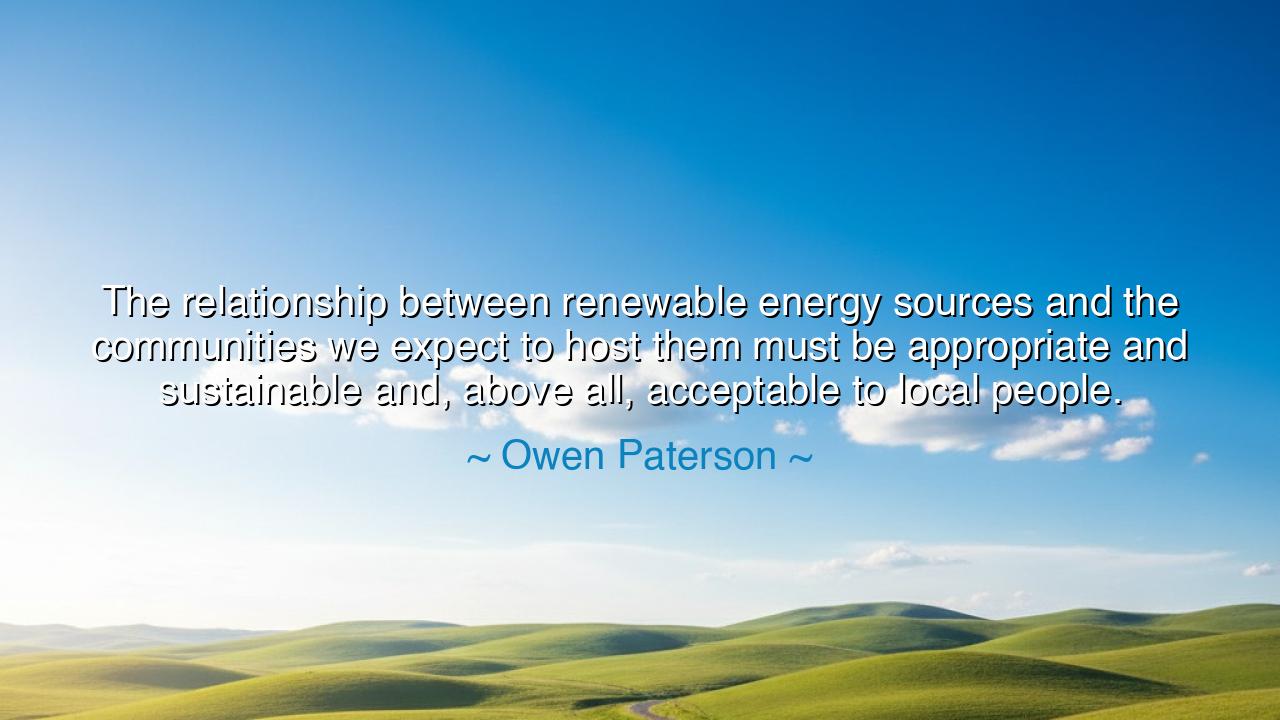
The relationship between renewable energy sources and the
The relationship between renewable energy sources and the communities we expect to host them must be appropriate and sustainable and, above all, acceptable to local people.






When Owen Paterson declares, “The relationship between renewable energy sources and the communities we expect to host them must be appropriate and sustainable and, above all, acceptable to local people,” he speaks with the voice of stewardship. His words remind us that progress, however noble, must be rooted in respect for those who dwell closest to the land. For no endeavor, however green or righteous, can endure if it ignores the hearts and wills of the communities upon which it is built.
The origin of this wisdom lies in the tension between human ambition and human belonging. As nations seek to harness the power of renewable energy sources to heal the earth, they must also reckon with the lived realities of those who bear their presence. Wind, sun, and water are gifts of creation, yet their harnessing alters landscapes, economies, and traditions. Paterson reminds us that these changes must not be imposed from above, but embraced in harmony with the people who call the land their home.
To call for what is “appropriate, sustainable, and acceptable” is to place three pillars beneath the structure of progress. Appropriate means fitting, respectful of place and culture. Sustainable means enduring, not depleting the earth or the spirit of the community. And acceptable means that consent has been sought and given, for without it, the endeavor is hollow and doomed to conflict. Thus, his words echo the ancient truth that no harvest is just if the field is taken without the farmer’s blessing.
His teaching also reminds us that the future cannot be built on disregard. Renewable energy is not merely about technology, but about trust. The winds that turn the turbines, the waters that drive the wheels, must do so in harmony with human lives, lest resentment grow where hope should be. True progress uplifts, unites, and respects; false progress tramples in its haste and is soon undone.
Let the generations to come remember: the bond between innovation and community must be sacred. The earth gives her resources, but men must use them with reverence, fairness, and consent. Owen Paterson’s words endure as a warning and a guide — that only by honoring the relationship between power and people can the promise of a sustainable world be fulfilled.






ALDuc Anh Le
Owen Paterson brings up an important and often overlooked issue: the relationship between renewable energy and local communities. We talk a lot about the global benefits of renewable energy, but what happens when local communities aren’t on board? What steps can be taken to make sure that these projects don’t just meet the energy needs but also respect the values and livelihoods of the people who live in these areas?
MMaianh
I agree with Owen Paterson’s perspective on the importance of community acceptance for renewable energy projects. The last thing we want is for these projects to create division or tension between local people and the government. How do we ensure that renewable energy solutions are both environmentally effective and socially acceptable? Could there be a way to integrate local knowledge and needs into the planning and execution of these projects?
TLNguyen Thanh Lam
Paterson’s words are so relevant today as more renewable energy projects are being developed globally. It’s easy to assume that renewable energy is universally accepted, but local concerns—be they environmental, economic, or cultural—are often overlooked. How can developers and governments better communicate the long-term benefits of these projects to local communities while addressing their concerns and ensuring they have a say in the process?
HMHong My
This quote really makes me think about the balance we need to strike between advancing renewable energy and respecting local communities. While renewable projects are critical for the environment, how do we ensure that they don't disrupt local cultures or economies? Is there a way to engage communities early on to ensure these projects are beneficial, not just in terms of energy production but also in terms of social and economic impacts?
HLHung Ho Le
Owen Paterson’s quote brings up an essential point about renewable energy—sustainability isn’t just about the environment; it’s about the communities too. I think it’s easy to forget that local populations must be fully onboard with these projects for them to truly succeed. How can we ensure that renewable energy projects meet the needs of both the environment and the people who live nearby, especially when there might be resistance or concerns from local communities?